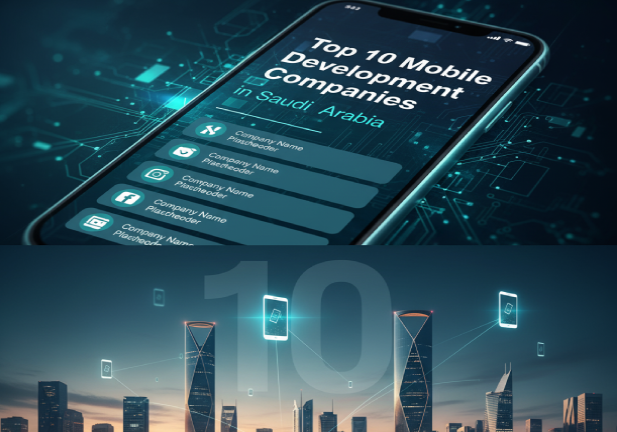Introduction — Saudi Arabia’s mobile moment
Saudi Arabia is one of the fastest-digitizing markets in the Middle East. Strong government backing for digital transformation (Vision 2030), high smartphone and internet penetration, and rapid adoption of fintech, e-commerce and government digital services have produced exceptional demand for mobile apps — across startups, enterprises and public sector projects. If you’re building an app for Riyadh, Jeddah, Dammam or a nationwide rollout, choosing a partner that understands local regulations (PDPL), Arabic UX, payment flows and GCC user behaviour is critical.
Why mobile apps are booming in Saudi Arabia
A few data-backed reasons behind the surge:
- Near-universal internet and mobile coverage. Recent digital reports show Saudi Arabia’s internet penetration approaching 99% with mobile connections exceeding population size (multiple connections per person), indicating a highly mobile audience for apps. That’s a clear signal for app-first strategies.
- Vision 2030 and government digitization. The national Vision 2030 roadmap explicitly prioritizes digital transformation, public services digitization, AI, and data initiatives — creating demand for secure, regulatory-compliant apps across health, education, transport and government services.
- Fintech & payments momentum. Payments modernization (digital wallets, BNPL, gateway expansion) and regulatory openness are pushing financial services providers and startups to build native apps.
- Young, mobile-first consumers. High smartphone usage, coupled with rising mobile commerce, means product/market fit often starts on a phone — not desktop.
- Events & investment flows. Conferences like LEAP and broad PIF investments in gaming and tech attract both international agencies and local studios to the Saudi market.
Implication for buyers: look for partners who combine strong product thinking, Arabic UX experience, compliance with PDPL (data protection) and experience integrating regional payment rails and identity systems.
How to choose the right mobile app development company in Saudi Arabia — checklist
Use this checklist when shortlisting and interviewing vendors:
- Local/regional experience
- Have they worked with Saudi/GCC clients? Do they understand Arabic-first UX (right-to-left, typography), cultural patterns and local app store listing needs?
- Relevant industry experience
- Fintech, healthcare, government, logistics, eCommerce — industry knowledge reduces regulatory friction and speeds discovery.
- Full-stack capabilities
- Product strategy, UX/UI design, native (Swift/Kotlin), cross-platform (Flutter/React Native), backend (cloud/DevOps), security & testing.
- Compliance & data security
- PDPL and sector regulations (SAMA for finance, MOH for healthcare). Ask for security audit reports or compliance declarations.
- Portfolio & references
- Real case studies, measurable KPIs (conversion, retention improvement), client references and independent reviews (Clutch, GoodFirms).
- Delivery model & communication
- Onshore/offshore balance, account management, Arabic support, and sprint cadence.
- Post-launch support
- Maintenance SLAs, app store management, analytics, and plans for iterative improvements.
- Cost transparency
- Clear pricing bands (MVP, mid-range, enterprise) and a realistic roadmap — don’t pick the lowest bidder by default.
- Techfit
- Which stacks do they prefer for your needs (e.g., Flutter for fast market entry; native for heavy-performance apps)?
- Cultural fit & speed
- Shared values, responsiveness and trustworthiness matter — especially for long-term partnerships.
When you interview agencies, give them a short discovery brief and ask for: Architecture sketch, Timeline (phases), Team CVs (or senior resource availability), and a comparable case study.
Top 10 Mobile App Development Companies in Saudi Arabia — profiles
1. Corewave
Overview & strengths: Corewave is positioned as a high-performance mobile app engineering studio with expertise in native Android/iOS, hybrid and modern UX. They emphasize performance, security and integration with enterprise systems. Corewave has a track record on Clutch with client reviews praising communication and on-time delivery.
Why pick them: Good choice for companies that need robust, enterprise-grade mobile apps and strong QA processes. Their reviews highlight technical delivery and project management — important for regulated industries such as healthcare and logistics.
Ideal projects: Enterprise apps, consumer apps that require fast performance, and apps with complex back-end integrations.
2. TekRevol — Riyadh (GCC focus)
Overview & strengths: TekRevol markets itself as a Gulf-focused digital transformation and product company with a local Saudi presence and a dedicated “mobile app development in Saudi Arabia” offering. They combine product design, mobile engineering and innovation services (including AI and fintech integrations). TekRevol frequently publishes Saudi-focused content and case studies on local use-cases.
Why pick them: Good for startups and scaleups seeking a product-led approach with an emphasis on rapid go-to-market and feature-rich apps.
Ideal projects: B2C marketplaces, fintech MVPs, consumer apps with strong design needs.
3. Mobcoder (Mobcoder SA) — Riyadh office
Overview & strengths: Mobcoder has set up a Riyadh presence and offers services ranging from mobile development to data analytics and AI. Their Saudi site highlights agentic AI and conversational AI offerings — useful for modern customer engagement apps. Mobcoder is a fit where combining intelligent backend systems with mobile UX is required.
Why pick them: If your app needs AI features (recommendations, chatbots) or deep analytics integrated with mobile, Mobcoder’s Saudi operation can be a good match.
Ideal projects: AI-enabled consumer apps, conversational assistants, personalization engines.
4. Synergy Labs — Riyadh (local boutique with enterprise work)
Overview & strengths: Synergy Labs appears as a Riyadh-based boutique agency that focuses on custom mobile apps, AI and IoT integrations. They promote a discovery-led approach and showcase regional case studies demonstrating Arabic UX and enterprise work. Clutch and other listings highlight Synergy’s emphasis on design and client collaboration.
Why pick them: Great when you want a boutique, high-touch studio that blends UX and engineering — often suited for government pilots, healthcare or smart city proofs of concept.
Ideal projects: Government services apps, healthcare, IoT-connected mobile experiences.
5. iSpectra — Jeddah (regional full-stack shop)
Overview & strengths: iSpectra positions itself as a full-stack digital product company in Jeddah with capabilities in native and cross-platform mobile development, backend architecture and digital marketing. They emphasize agile delivery and a customer-centric process.
Why pick them: If your project benefits from a Saudi-headquartered team (Jeddah) with local knowledge, iSpectra is worth shortlisting.
Ideal projects: SME apps, eCommerce, and regional rollouts requiring Arabic UX and local marketing integration.
6. Inova LLC — regional product specialists
Overview & strengths: Inova is a regional software and app studio with multi-country presence in the GCC and North Africa. They highlight full-stack product development experience and have completed numerous mobile projects across industries. Their portfolio focuses on scalable architectures and backend-first systems.
Why pick them: Well-suited for enterprise clients seeking robust backend systems and scalable mobile front-ends that must integrate with regional systems.
Ideal projects: Enterprise mobility, logistics platforms and apps needing multi-region deployments.
7. e-Sealed (eSealed) — Riyadh (est. presence since 2006)
Overview & strengths: e-Sealed is a Saudi-based shop focused on software and information security, eCommerce development, and hardware solutions. Their local history and specialization in secure systems make them a reliable partner for regulated or security-sensitive apps.
Why pick them: When security and local compliance are non-negotiable (e.g., government or regulated sectors), local firms like e-Sealed are attractive for their domain knowledge.
Ideal projects: Secure government services, identity & access mobile solutions, and enterprise apps needing hardware integration.
8. TechGropse — regional product engineering partner
Overview & strengths: TechGropse promotes mobile app development services tailored to Riyadh and the GCC with an emphasis on product engineering, AI and AR/VR. They market affordable and flexible engagement models for Saudi clients and maintain GCC operations.
Why pick them: A good choice for startups that want a feature-rich app at competitive price points and for teams that want quicker MVPs with iterative upgrades.
Ideal projects: B2C apps, AR/VR experiences for retail, and apps integrating AI features.
9. Appinventiv — global firm with Saudi offerings
Overview & strengths: Appinventiv is a well-known global mobile product studio with a Saudi-focused practice page. They emphasize enterprise digital transformation, fintech, AI and cloud integrations — and promote compliance with regional regulations (PDPL, sectoral requirements). Appinventiv’s global scale and product thinking make them a frequent choice for large projects.
Why pick them: When you need a large team, cross-regional experience, or complex integrations (banking, payments, identity), Appinventiv has the capability and case studies to match.
Ideal projects: Large fintech apps, cross-border marketplaces, enterprise mobility programs.
10. Hyperlink InfoSystem — regional presence & high throughput
Overview & strengths: Hyperlink InfoSystem is an established global app & web development company that markets services to Riyadh and other GCC cities via regional landing pages. They are known for large delivery capacity (many apps delivered worldwide) and broad technical stacks (including AR/VR, blockchain and game dev). Use them when you need scale and relatively predictable cost bands.
Why pick them: If your priority is high throughput, predictable budgets and a large, multi-disciplinary delivery team, Hyperlink can be considered — but always pair with local PM oversight to ensure cultural fit.
Ideal projects: High-volume development (multiple parallel releases), eCommerce rollouts, and feature-heavy consumer apps.
Quick comparison table
| Company | Location / Presence | Best for | Sample strengths |
|---|---|---|---|
| Corewave | Riyadh / Global | AI & Enterprise mobile apps | Large delivery capacity, broad services |
| TekRevol | Riyadh / GCC | Product-led startups | Product design + Saudi case studies |
| Mobcoder | Riyadh office | AI & analytics apps | AI + conversational UX in Saudi. |
| Synergy Labs | Riyadh | Boutique UX + enterprise pilots | UX-forward, discovery approach. |
| iSpectra | Jeddah | Regional full-stack | Local HQ, agile delivery. |
| Inova LLC | Riyadh / GCC | Backend-first enterprise projects | Scalable architecture work. |
| e-Sealed | Riyadh | Security-sensitive projects | Local security & embedded systems. |
| TechGropse | GCC operations | MVPs & AR/VR | Product engineering at competitive cost. |
| Appinventiv | Global with KSA pages | Large fintech & enterprise | Big-team capacity, compliance focus. |
| Hyperlink InfoSystem | Global with KSA pages | High volume development | Strong QA & engineering |
Emerging trends in Saudi mobile app development (2025)
- AI & Generative features inside apps — From personalized recommendations to agentic virtual assistants, many app projects now include LLM/AI capabilities for user engagement and automation. Agencies with AI experience are increasingly preferred.
- Fintech & digital wallets — Saudi’s payments ecosystem is opening to international wallets and local innovations; apps that integrate new payment instruments and local compliance (SAMA) are in demand.
- Super apps & platformization — Inspired by regional ride-hailing and delivery success, companies are exploring multi-service apps (wallet + marketplace + transport) requiring modular architecture.
- AR/VR for retail and training — Retailers and enterprise training programs are piloting AR/VR mobile features to boost conversions and enable remote workforce training.
- Government digital services & identity integration — Integration with government digital identity services and Absher-style portals is a growing requirement for public sector apps.
- Edge computing & 5G use-cases — As 5G expands, low-latency mobile features (real-time video, AR) will become more common in Saudi projects. GSMA and regional reports highlight the growing mobile economy value.
What to ask your vendor about trends: Do they have LLM/AI proof-of-concepts? Have they integrated with regional payment gateways (STC Pay, Mada, others)? What’s their approach to modular platform design for potential super app evolution?
FAQs
How much does it cost to build a mobile app in Saudi Arabia?
Costs vary by complexity: a simple MVP can start around USD 20k–50k, a mid-range business app commonly sits between USD 50k–150k, and enterprise or fintech apps (high security, integrations) often exceed USD 150k. Many agencies publish local-market ranges and will provide ballpark estimates after a 1–2 hour discovery.
How long does it take to build a mobile app?
Typical timelines: simple MVPs 8–12 weeks, mid-complex apps 3–6 months, and feature-heavy enterprise apps 6–12+ months (depending on integrations, compliance, and testing cycles). Agile delivery with defined sprints and biweekly releases speeds validation.
Should I hire a local Saudi agency or an international firm?
If your app heavily depends on local regulation, Arabic UX or partnerships, a local/Saudi-based partner offers advantages (faster approvals, Arabic support). International firms are useful for scale, specialised tech (AI/LLMs) or if you want multi-market launches. Many clients adopt a hybrid model: onshore PM + offshore dev team.
What are common mistakes when hiring an app agency in KSA?
- Choosing the lowest bidder without reference checks.
- Skipping a discovery phase (leads to scope creep).
- Not ensuring PDPL/data protection compliance.
- Ignoring post-launch maintenance budgets.
Does the app need Arabic first design?
If the target market is Saudi users, yes — design for Arabic (right-to-left flows), localized content, and Arabic-first testing ensures better user adoption.
Conclusion
Saudi Arabia is a high-opportunity market for mobile apps. Whether you’re a local startup, a growing SME, or an enterprise planning to digitize workflows, the right development partner will combine product thinking, Arabic UX expertise, security/compliance knowledge and delivery capacity.









.jpg)


